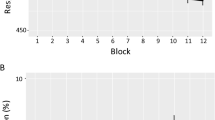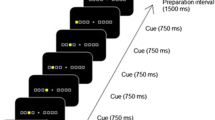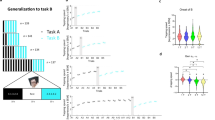Abstract
Subjects are able to learn even very complex serial patterns in serial-reaction-time tasks. The investigation of the learning processes behind this phenomenon has yielded contradictory results. Some studies have come to the conclusion the subjects had learned the sequence of stimuli. Other studies have assumed that the sequence of responses had been learned or a combination of both stimuli and responses. The present experiments stress the impact of motor responses on serial-pattern learning. The subjects had to respond to serial targets that were presented within a matrix of distractors. The position of each target could be predicted from the identity and position of the previous target. If the subjects were to learn this pattern, they would be able to speed up the search for the target and give faster responses. The results indicated that the relation between the target identity and the position of the next target was acquired much better by those subjects who had to respond to each target with a special motor response. If the same response was required for the relevant targets, knowledge of the rule was somewhat fragmentary. To explain these results, mechanisms of motor learning and motor planning are discussed. It is assumed that learning of the rules occurs if the position changes appear to be effects of different motor responses.
Similar content being viewed by others
References
Bolles, R. C. (1972). Reinforcement, expectancy, and learning. Psychological Review, 79, 394–409.
Cantor, J. H. (1965). Transfer of stimulus pretraining to motor paired-associate and discrimination learning task. In L. P. Lipsitt & C. C. Spiker (Eds), Advances in child development and behavior (Vol. 2). New York: Academic Press.
Cohen, A., Ivry, R. I., & Keele, S. W. (1990). Attention and structure in sequence learning. Journal of Experimental Psychology: Learning, Memory, and Cognition, 16, 17–30.
Rivera, J. de (1959). Some conditions governing the use of the cue-producing response as an explanatory device. Journal of Experimental Psychology, 57, 299–304.
Gibson, J. J., & Gibson, E. J. (1955). Perceptual learning: Differentiation or enrichment? Psychological Review, 62, 32–41.
Hoffmann, J. (1992). Lernen: S-R, S-S oder R-S Verbindungen und der Aufbau einer antizipativen Verhaltenssteuerung. In L. Montada (Ed.), Bericht über den 38. Kongress der Deutschen Gesellschaft für Psychologie in Trier 1992, Band 2. Göttingen: Hogrefe.
Hoffmann, J. (1993a). Unbewußtes Lernen — eine besondere Lernform? Psychologische Rundschau, 44, 75–89.
Hoffmann, J. (1993b). Vorhersage und Erkenntnis: Die Funktion von Antizipationen in der menschlichen Verhaltenssteuerung. Göttingen: Hogrefe
Holyoak, K. J., Koh, K., & Nisbett, R. E. (1989). A theory of conditioning: Inductive learning within rule-based default hierarchies. Psychological Review, 96, 315–340.
Hommel, B. (1992). The cognitive representation of action: Evidence from effects of correspondence between irrelevant stimulus information and conditioned action effects. Annual Meeting of the Psychonomic Society, San Francisco.
Howard, J. H., Mutter, S. A., & Howard, D. V. (1992). Serial pattern learning by event observation. Journal of Experimental Psychology: Learning, Memory, and Cognition, 18, 1029–1039.
Lewicki, P. (1986). Nonconscious social information processing. New York: Academic Press.
Lewicki, P., Czyzewska, M., & Hoffman, H. (1987). Unconscious acquisition of complex procedural knowledge. Journal of Experimental Psychology: Learning, Memory, and Cognition, 13, 523–530.
Müller, P. H., Neumann, P, & Storm, R. (1973). Tafeln der mathematischen Statistik. Leipzig.
Nattkemper, D., & Prinz, W. (1993). Processing structured event sequences. In C. Bundesen & A. Larsen (Eds.), Proceedings of the sixth conference of the European Society for Cognitive Psychology, 21–22.
Nissen, M. J., & Bullemer, P. (1987). Attentional requirements of learning: Evidence from performance measures. Cognitive Psychology, 19, 1–32.
Norcross, K. J. (1958). Effects of discrimination performance of similarity of previously acquired stimulus names. Journal of Experimental Psychology, 56, 305–309.
Prinz, W. (1992). Why don't we perceive our brain states? European Journal of Cognitive Psychology, 4, 1–20.
Rivera, J. de (1959). Some conditions governing the use of the cue-producing response as an explanatory device. Journal of Experimental Psychology, 57, 299–304.
Shanks, D. R. (1985). Continuous monitoring of human contingency judgment across trials. Memory & Cognition, 13, 158–167.
Shiffrin, R. M., & Schneider, W. (1977). Controled and automatic human information processing: II. Perceptual learning, automatic attending, and a general theory. Psychological Review, 84, 127–190.
Schmidt, R. A. (1975). A schema theory of discrete motor skill learning. Psychological Review, 82, 225–260.
Stadler, M. A. (1989). On learning complex procedural knowledge. Journal of Experimental Psychology: Learning, Memory, and Cognition, 15, 1061–1069.
Willingham, D. B., Nissen, M. J., & Bullemer, P. (1989). On the development of procedural knowledge. Journal of Experimental Psychology: Learning, Memory, and Cognition, 15, 1047–1060.
Author information
Authors and Affiliations
Rights and permissions
About this article
Cite this article
Zießler, M. The impact of motor responses on serial-pattern learning. Psychol. Res 57, 30–41 (1994). https://doi.org/10.1007/BF00452993
Received:
Accepted:
Issue Date:
DOI: https://doi.org/10.1007/BF00452993




